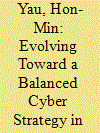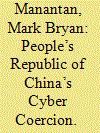|
|
|
Sort Order |
|
|
|
Items / Page
|
|
|
|
|
|
|
| Srl | Item |
| 1 |
ID:
173991


|
|
|
|
|
| Summary/Abstract |
This paper investigates the limits of implementing a cyber deterrence strategy in East Asia. Given that national security documents from both Taiwan and Japan indicate the need to deter state-sponsored cyberattacks, there is very little literature that empirically and theoretically investigates the utility of such an approach in this region. This paper looks into the various deterrence constructs and argues that none of them can be implemented without problems. The paper looks further into a deeper level of the conceptual issues upon which deterrence thinking is based and argues that an alternative strategy promoting regional cooperation is not only possible but also desirable in the current political climate. It is later concluded that looking for a one-size-fits-all solution is idealistic, and policymakers should develop security countermeasures that align with the threats posed by the actors they wish to confront.
|
|
|
|
|
|
|
|
|
|
|
|
|
|
|
|
| 2 |
ID:
173989


|
|
|
|
|
| Summary/Abstract |
As Indonesia’s economy gradually improves, the government has been actively promoting its horizontal cooperation among developing countries by playing a prominent role as a non-DAC (Development Assistance Committee) provider. Though the country has been receiving aid over the past two decades, it has also been providing to other developing countries in the Pacific region. However, Indonesia’s relations with these countries face contention due to it being perceived as “big and aggressive.” This is evident in its decision to oppose the independence of Papua. After decades of seeking good relations, Jakarta has opened its Eastern door by creating a closer link with the Pacific countries through the provision of aid. As it moved from ignorance to awareness, Indonesia’s approach was aimed at solving domestic problems related to its national integration and territorial integrity in the east, particularly the issue of Papuan independence. The country made use of aid as its primary diplomatic tool in its “Look East” policy. This paper investigates the extent to which this policy has been instrumental in rebuilding, restoring, and improving Indonesia’s image among Pacific countries. It argues that the ethnic dimension is one of the critical determinants in diplomatic relations, and ignorance could lead to its failure. Furthermore, it shows that the use of aid has resulted in a constructive impact that has been evident in a decrease in support for Papua separatism in the South Pacific region.
|
|
|
|
|
|
|
|
|
|
|
|
|
|
|
|
| 3 |
ID:
173987


|
|
|
| 4 |
ID:
173990


|
|
|
|
|
| Summary/Abstract |
This paper investigates the increasing use of cyber coercion by the People’s Republic of China (PRC) among its core interests: Taiwan, Hong Kong, and the South China Sea. It argues that the PRC’s deployment of sophisticated attacks in the form of cyber coercion continues to be part of its geostrategic playbook to exert its influence and prosecute its wider interests as a rising power in the Indo-Pacific region. However, it observes that cyber coercion will be employed by the PRC in concert with all the other tools — diplomatic, economic, and the political — across the spectrum. The paper has two broad goals: first to unpack the trends or patterns in the PRC-sponsored cyber coercion by accentuating contextual and operational dimensions using Taiwan, Hong Kong, and the South China Sea as analytical case studies; second, to highlight the opportunities and limitations of using cyber coercion as an asymmetrical capability in the changing threat landscape. The paper concludes that the PRC’s cyber coercion is characterized by blurring the distinction on what constitutes compellence and deterrence. The boundaries are not clear cut, and to a certain degree both are even mutually reinforcing. The in-depth analysis of the case studies reveals the growing prominence of disinformation campaigns in close coordination with cyber operations (malware, phishing, and DDoS attack). This emboldens the PRC with a myriad of coercive strategies in shaping its external environment and realizing its ambition of national rejuvenation across Taiwan, Hong Kong, and the South China Sea.
|
|
|
|
|
|
|
|
|
|
|
|
|
|
|
|
| 5 |
ID:
173988


|
|
|
|
|
| Summary/Abstract |
This paper examines the implications of the United States’ “hub-and-spoke” alliance system in Asia. It argues that the US enjoys a bargaining advantage in the current bilateral security relations with its Asian allies. In contrast to a multilateral alliance, the US can better prevent free riders and joint resistance in its bilateral relations. It can effectively restrain the behavior of its allies and compel them to accommodate American interests. The hub-and-spoke system helps the US consolidate its policy influence over the Asian allies, supervise inter-alliance cooperation, and increase defense cooperation between allies and non-allies. This paper uses episodes of defense cooperation between the US, Japan, South Korea, Australia, and India to illustrate the American alliance management techniques since 2016. During this time, the US allies have increasingly participated in regional security affairs due to US demands and guidance rather than autonomous decisions. Facing strong US pressure, allies have found it hard to challenge the US under the hub-and-spoke system despite common grievances. This leads to two implications for the future: First, the US allies may have less autonomy in their foreign policies, restraining their ability to pursue neutral positions and policies in regional affairs such as the South China Sea dispute. Second, the US may discourage or even undermine the emergence of multilateral security institutions in Asia. The US is likely to maintain the “hub-and-spoke” system to safeguard its strategic interests in the Indo-Pacific.
|
|
|
|
|
|
|
|
|
|
|
|
|
|
|
|
|
|
|
|
|